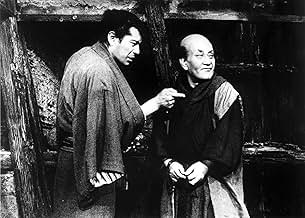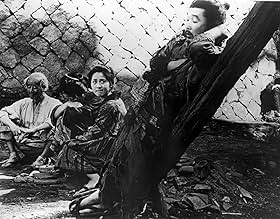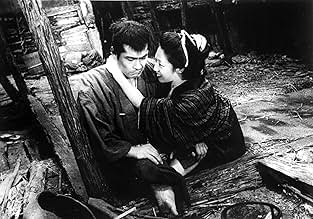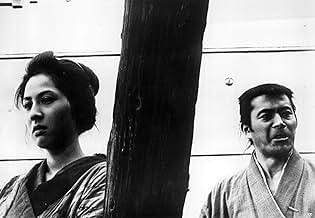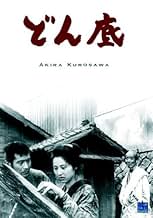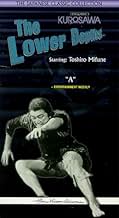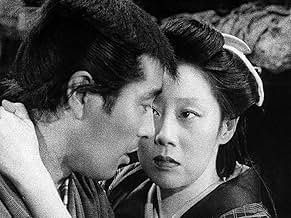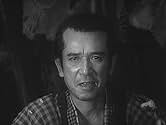IMDb RATING
7.2/10
6.3K
YOUR RATING
In a Japanese slum, various residents play out their lives, dreaming of better things or settling for their lot. Among them is a man who pines for a young woman but is stymied by her decepti... Read allIn a Japanese slum, various residents play out their lives, dreaming of better things or settling for their lot. Among them is a man who pines for a young woman but is stymied by her deceptive family.In a Japanese slum, various residents play out their lives, dreaming of better things or settling for their lot. Among them is a man who pines for a young woman but is stymied by her deceptive family.
- Director
- Writers
- Stars
- Awards
- 5 wins total
Kamayuki Tsubono
- Tradesman
- (uncredited)
- Director
- Writers
- All cast & crew
- Production, box office & more at IMDbPro
7.26.3K
1
2
3
4
5
6
7
8
9
10
Featured reviews
10davidals
Very underrated Kurosawa masterpiece
LOWER DEPTHS perhaps isn't the place to start if you're completely unfamiliar with Kurosawa - but it still ranks as one of his great films, and definitely one of his most underrated.
Based on a Maxim Gorky play (an earlier Jean Renoir film draws upon the same source material), LOWER DEPTHS seems a bit stagey at first, but Kurosawa manages to enliven it considerably - the performances are all top-notch, and the combination of skillful editing (straight cuts only here, but the usual Kurosawa multi-camera shooting method) and inventive set design (with diagonals and angles trapping characters, heighetning the intensity of the dialogue and acting) making this an unforgettable film to watch - easily as accomplished as the better known THRONE OF BLOOD from a little earlier. One will definitely note how tightly constructed - in all ways - this film is.
This film does (along with IKIRU, RED BEARD and HIGH & LOW) illuminate some of Kurosawa's underlying philosophies, specifically a sense of social realism in cinema that can cast a critical gaze upon injustice, and in this film a sense of anger and frustration is articulated with an unusual degree of eloquence, testament to both Kurosawa's technical virtuosity, and his greater awareness of the world.
But for all of the cruelty on display here, there's an equal amount of humor, typically irreverent and loaded with sly social commentary, but also spontaneous: the two impromptu musical episodes, which blend Japanese theatrical conventions with a Chaplin-like sense of visual choreography to very striking effect.
Not as well known as SEVEN SAMURAI, THRONE OF BLOOD or YOJIMBO, but just as accomplished - filled with delight and insight.
Based on a Maxim Gorky play (an earlier Jean Renoir film draws upon the same source material), LOWER DEPTHS seems a bit stagey at first, but Kurosawa manages to enliven it considerably - the performances are all top-notch, and the combination of skillful editing (straight cuts only here, but the usual Kurosawa multi-camera shooting method) and inventive set design (with diagonals and angles trapping characters, heighetning the intensity of the dialogue and acting) making this an unforgettable film to watch - easily as accomplished as the better known THRONE OF BLOOD from a little earlier. One will definitely note how tightly constructed - in all ways - this film is.
This film does (along with IKIRU, RED BEARD and HIGH & LOW) illuminate some of Kurosawa's underlying philosophies, specifically a sense of social realism in cinema that can cast a critical gaze upon injustice, and in this film a sense of anger and frustration is articulated with an unusual degree of eloquence, testament to both Kurosawa's technical virtuosity, and his greater awareness of the world.
But for all of the cruelty on display here, there's an equal amount of humor, typically irreverent and loaded with sly social commentary, but also spontaneous: the two impromptu musical episodes, which blend Japanese theatrical conventions with a Chaplin-like sense of visual choreography to very striking effect.
Not as well known as SEVEN SAMURAI, THRONE OF BLOOD or YOJIMBO, but just as accomplished - filled with delight and insight.
Worth every bit of patience
The Criterion Collection offers two different film versions of "The Lower Depths": one made in 1936 by Jean Renoir and another one made in 1957 by Kurosawa. The two directors never worked together on either film. In fact, they only met once in their lives, many years later. Both films are based on Russian writer Maxim Gorky's 1902 play, which describes life in a miserable slum where most characters have lost all sense of hope. Renoir deals with this serious subject matter in a much more humorous and amusing way than Kurosawa, whose film is slower, decidedly somber and a lot more difficult to digest. While Renoir's work takes the viewer in and out of the slums, Kurosawa doesn't allow one to see beyond the wretchedness of the underworld. Both films are great, but it was probably Kurosawa's which left a more durable and deeper impression on me.
The Human Heart in the Depths
It's one of Kurosawa's most neglected masterpieces. "The Lower Depths" takes us into a ravine tenement, run by greedy, brutal landlords, and inhabited by the lowest of society's strata. All action takes place in two locations: the interior of the tenement, or the tenement grounds.
How amazing, then, is the fascination this film exerts on us, with its very modest settings. I am astonished at the creativity of the film shooting these restricted spaces, in so many varied and telling ways: space expands and contracts as is necessary to the story: the outside is either threatening or an escape, but even once outside, we see that there is no escape, and diagonals show us the human dimensions of restricted choice. Space speaks volumes in the film, accompanied by the beauty of the ensemble acting, expressing profound truths.
We find ourselves engaged in the lives of these people, and puzzled over the character of Bokuzen Hidari as the pilgrim. Is he good? If he is good, and pacifies the dispossessed by acknowledging their illusions, does it mean that self-deception is good? What wonderful ensemble acting! The director put them through long, tough rehearsals, and the result is a seamless film. No wrong notes, no overacting, just a beautiful and strange film that haunts us after we've experienced it. Such invisible, great acting, and humor and pathos.
The character of the actor is the finest piece of work by the Kurosawa veteran Kamatari Fujiwara. It is amazing that this actor appears in such diverse roles as Matahichi in "The Hidden Fortress" and as a corrupt executive in "The Bad Sleep Well". What astonishing range and depth! How brilliantly Kurosawa uses the actor's range! And, of course, we have our beloved Toshiro Mifune, laughing, kicking up his heels in devilish delight, trying to impress the girl, pouting with the landlady, listening with suspicion, then respect to the pilgrim...doing so many things so well, we are bereft when he is absent for the film's conclusion.
And what a conclusion! The harsh clappers that end the movie, the frontal shot of the gambler as he addresses us (for the only time in the film) directly, and the sudden end! Gorky...Kurosawa, Bokuzen Hidari, Toshiro Mifune, Kamatari Fujiwara and the rest....they live on in this masterpiece, for which I am very grateful.
How amazing, then, is the fascination this film exerts on us, with its very modest settings. I am astonished at the creativity of the film shooting these restricted spaces, in so many varied and telling ways: space expands and contracts as is necessary to the story: the outside is either threatening or an escape, but even once outside, we see that there is no escape, and diagonals show us the human dimensions of restricted choice. Space speaks volumes in the film, accompanied by the beauty of the ensemble acting, expressing profound truths.
We find ourselves engaged in the lives of these people, and puzzled over the character of Bokuzen Hidari as the pilgrim. Is he good? If he is good, and pacifies the dispossessed by acknowledging their illusions, does it mean that self-deception is good? What wonderful ensemble acting! The director put them through long, tough rehearsals, and the result is a seamless film. No wrong notes, no overacting, just a beautiful and strange film that haunts us after we've experienced it. Such invisible, great acting, and humor and pathos.
The character of the actor is the finest piece of work by the Kurosawa veteran Kamatari Fujiwara. It is amazing that this actor appears in such diverse roles as Matahichi in "The Hidden Fortress" and as a corrupt executive in "The Bad Sleep Well". What astonishing range and depth! How brilliantly Kurosawa uses the actor's range! And, of course, we have our beloved Toshiro Mifune, laughing, kicking up his heels in devilish delight, trying to impress the girl, pouting with the landlady, listening with suspicion, then respect to the pilgrim...doing so many things so well, we are bereft when he is absent for the film's conclusion.
And what a conclusion! The harsh clappers that end the movie, the frontal shot of the gambler as he addresses us (for the only time in the film) directly, and the sudden end! Gorky...Kurosawa, Bokuzen Hidari, Toshiro Mifune, Kamatari Fujiwara and the rest....they live on in this masterpiece, for which I am very grateful.
9KFL
The positive functions of "useful lies"
Having watched Kurosawa's retelling of Dostoyevsky's "The Idiot" a couple weeks ago, and come away feeling that one viewing was already a bit too much, I was not expecting much from this. After all, Gorky is generally regarded as a notch or three below Dostoyevsky.
But whereas "The Idiot" did not begin to mesh with a Japanese idiom, "The Lower Depths" fits in very well indeed. Much of the film involves the hopes, dreams, schemes and machinations of a handful of characters, all fixated on escaping the tenement and its soul-numbing poverty.
An enigmatic old man who appears one day and spends some time in the hovel has a salutary effect on several of the residents, merely by dint of a level of kindness and sympathy that any of us would take for granted. When he leaves, the spark of compassion he has kindled dies quickly. Yet before he arrives and after he has left, there nonetheless remains a minimal spirit of camaraderie. I have not read Gorky's novel, but the "depths" here may (be taken to) refer to this bare-minimum level of feeling for one's fellow paupers.
Running through the script is the theme of lies and (self-)deception, and how they can ease the bitter reality that society's outcasts must face every day. This above all works well here, for the Japanese themselves have a utilitarian (so to speak) view of truth and falsehoods. The hoary Japanese adage "uso mo houben", often rendered "a white lie can be expedient", could have been a tagline for this movie; for the alcoholic ex-actor and several others have little other than self-delusion to help them get through another day.
Kurosawa manages to inject a measure of droll comedy while keeping the grim facts unprettified, showing us how the luckless souls at the very bottom of society grasp at the slimmest of hopes and somehow manage (...or don't manage) to keep on going. Superb.
But whereas "The Idiot" did not begin to mesh with a Japanese idiom, "The Lower Depths" fits in very well indeed. Much of the film involves the hopes, dreams, schemes and machinations of a handful of characters, all fixated on escaping the tenement and its soul-numbing poverty.
An enigmatic old man who appears one day and spends some time in the hovel has a salutary effect on several of the residents, merely by dint of a level of kindness and sympathy that any of us would take for granted. When he leaves, the spark of compassion he has kindled dies quickly. Yet before he arrives and after he has left, there nonetheless remains a minimal spirit of camaraderie. I have not read Gorky's novel, but the "depths" here may (be taken to) refer to this bare-minimum level of feeling for one's fellow paupers.
Running through the script is the theme of lies and (self-)deception, and how they can ease the bitter reality that society's outcasts must face every day. This above all works well here, for the Japanese themselves have a utilitarian (so to speak) view of truth and falsehoods. The hoary Japanese adage "uso mo houben", often rendered "a white lie can be expedient", could have been a tagline for this movie; for the alcoholic ex-actor and several others have little other than self-delusion to help them get through another day.
Kurosawa manages to inject a measure of droll comedy while keeping the grim facts unprettified, showing us how the luckless souls at the very bottom of society grasp at the slimmest of hopes and somehow manage (...or don't manage) to keep on going. Superb.
Too Polished
First, I must provide the obligatory warning that this film is absolutely not a good film for introducing a viewer to the power of Kurosawa. Nevertheless, this film is one of his most well-crafted ensemble films. The performance of Bokuzen Hidari as the wandering pilgrim or priest Kahei is his pinnacle in Kurosawa's films. After his comic-relief roles in the more well known films "Ikiru" and "Seven Samurai", this role is Hidari's chance to show his own version of wisdom and authority. Similarly, Kamatari Fujiwara's powerfully sympathetic performance as the alcoholic actor is another surprising demonstration by an actor who had, hitherto, been cast in unsympathetic- even adversarial roles in previous Kurosawa films. As one comes to expect from Isuzu Yamada, her character is a feisty and commanding presence that drives the plot along.
Toshiro Mifune, however, was not the best choice for his role as the petty thief- try as he might to look like a immature and puerile common criminal , the false swagger fails to hide the actor's inherent dignity. Nevertheless, his energy and effort still make his performance believable- if incongruous. In general, however, his unsuitability for his role is the only significant snag in an otherwise fluid and natural performance on the part of all the actors. Also, the sets, as one would expect for Kurosawa, are meticulously detailed, well-lit, and authentic-seeming.
The story- based on the Maxim Gorky play, however, is not that compelling. In part, I think, it is my reaction to a socialistic morality play brought to the silver screen. Also, however, Kurosawa has tried too hard and has polished the performance and settings for too long. As well and smoothly as the actors interact, as convincing they are in their roles, their performance just does not lead anywhere dramatically. However, I saw the Jean Renoir version- a much less refined effort, in my opinion- and had much the same reaction, concluding that the story, itself, and not Kuroasawa's over-controlling treatment is what hampered my engagement.
In spite of that... That is to say... In spite of the fact that the movie's story is not very compelling for me at all, I still have high regard for the film because the acting performances are so solid and engaging. For that reason, I strongly urge devotees of Kurosawa's films to check this movie out at some point while keeping in mind that it remains less than a sum of its parts.
Toshiro Mifune, however, was not the best choice for his role as the petty thief- try as he might to look like a immature and puerile common criminal , the false swagger fails to hide the actor's inherent dignity. Nevertheless, his energy and effort still make his performance believable- if incongruous. In general, however, his unsuitability for his role is the only significant snag in an otherwise fluid and natural performance on the part of all the actors. Also, the sets, as one would expect for Kurosawa, are meticulously detailed, well-lit, and authentic-seeming.
The story- based on the Maxim Gorky play, however, is not that compelling. In part, I think, it is my reaction to a socialistic morality play brought to the silver screen. Also, however, Kurosawa has tried too hard and has polished the performance and settings for too long. As well and smoothly as the actors interact, as convincing they are in their roles, their performance just does not lead anywhere dramatically. However, I saw the Jean Renoir version- a much less refined effort, in my opinion- and had much the same reaction, concluding that the story, itself, and not Kuroasawa's over-controlling treatment is what hampered my engagement.
In spite of that... That is to say... In spite of the fact that the movie's story is not very compelling for me at all, I still have high regard for the film because the acting performances are so solid and engaging. For that reason, I strongly urge devotees of Kurosawa's films to check this movie out at some point while keeping in mind that it remains less than a sum of its parts.
Did you know
- TriviaThe entire film was shot mostly in sequence and was finished in about four weeks.
- Quotes
Sutekichi the Thief: Lies trump the truth every time.
- ConnectionsFeatured in The 62nd Annual Academy Awards (1990)
- How long is The Lower Depths?Powered by Alexa
Details
- Runtime
- 2h 17m(137 min)
- Color
- Sound mix
- Aspect ratio
- 1.37 : 1
Contribute to this page
Suggest an edit or add missing content

